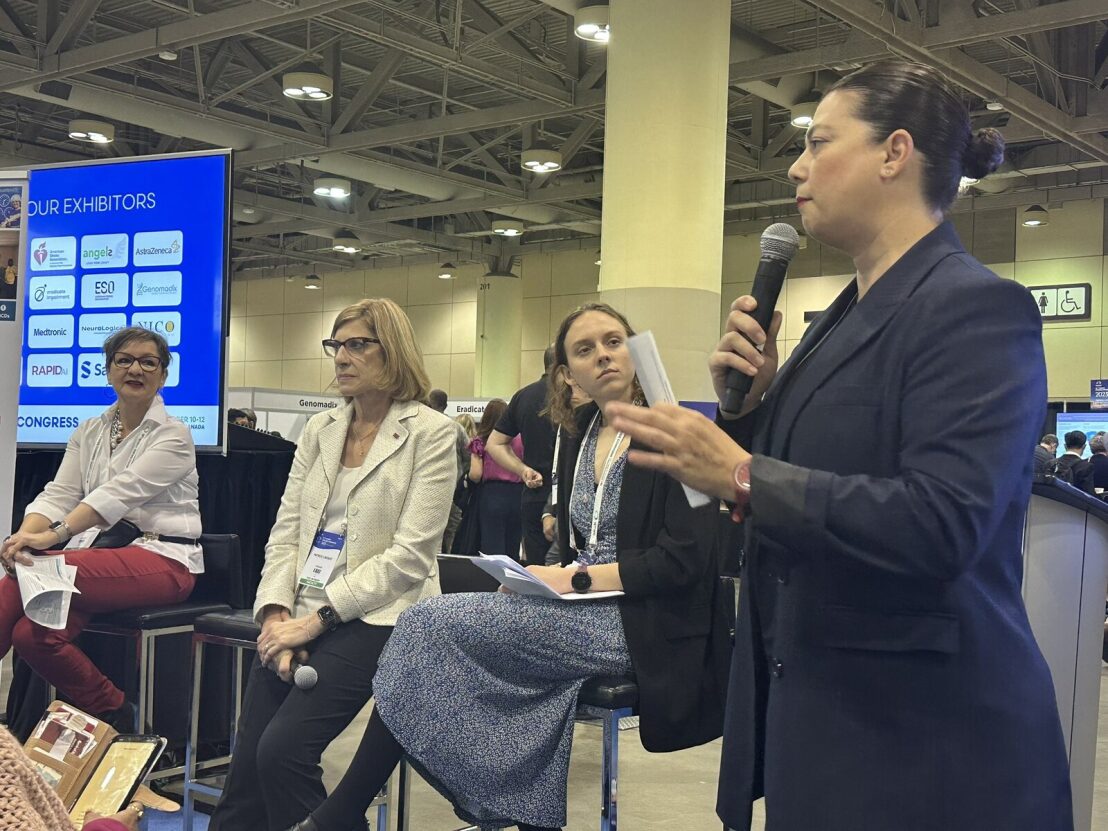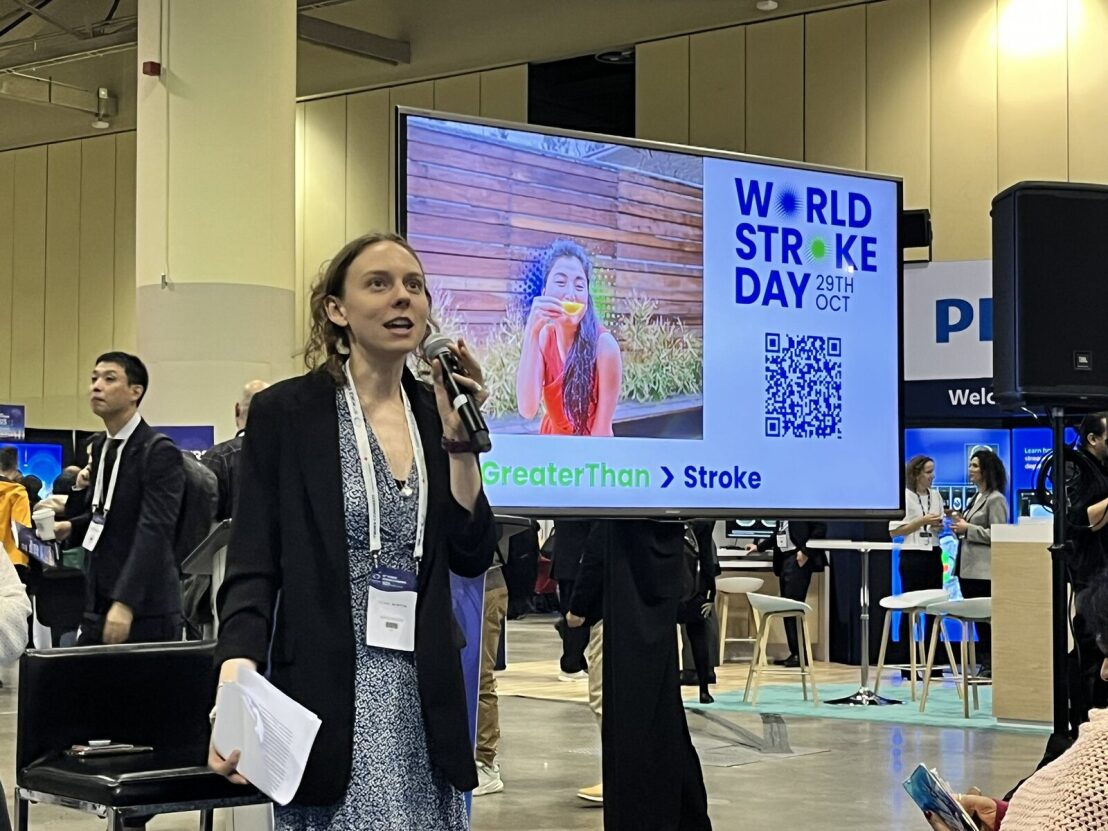The 15th World Stroke congress on 10-12 October 2023 welcomed in person attendance from over 2000 participants from across the globe. These participants had the opportunity to attend the Stroke and noncommunicable disease (NCD) dialogue, a series of four sessions co-hosted by World Stroke Organization, American Stroke Association, Heart & Stroke Foundation Canada and NCD Alliance.
The Stroke and NCD Dialogue took place during the congress coffee breaks and aimed to discuss stroke within the context of other NCDs that share common risk factors, such as heart disease and cancer, encouraging conversation between speakers and attendees in an interactive and engaging environment. Across the four sessions, a total of 14 speakers from 10 countries and a variety of backgrounds in the stroke and NCD community, shared their perspectives on key priorities within the NCDs and Universal Health Coverage (UHC) agenda.
The solutions to lowering NCD mortality exist within the successful implementation of NCDs prevention and care policy and the progressive achievement of UHC. UHC, the commitment to ensuring financial protection from high out-of-pocket healthcare payments and access to quality essential healthcare for all, was spotlighted at the global level in 2019 at the first UN High-Level Meeting (HLM) on UHC. On 21 September 2023, the global health community convened once more at the HLM on UHC to advance the UHC agenda. In the lead up to this HLM, the NCD Alliance community called on governments to uphold their commitments to UHC across the three dimensions of service coverage, financial coverage and population coverage. This call was centred around four advocacy priorities, which provided a focus for each of the four sessions within the 2023 Stroke and NCD Dialogue.
The first session discussed meaningful involvement of people living with stroke and NCDs and how we can ENGAGE people living with NCDs to keep UHC people centered, highlighting that people who experience a stroke are the real experts in their healthcare journey and there are global frameworks in place to support involving them in policymaking processes. Session 2 focused on how we can ACCELERATE UHC implementation by including quality NCD prevention and care services in country UHC health benefit packages. Stroke was highlighted as an impactful example that demonstrates the need to consider the entire continuum of care from stroke prevention at the community level all the way to stroke rehabilitation services. The third session provided valuable insights from different countries on the need to INVEST in the prevention and control of NCDs through adequate, predictable and sustained resources for UHC. The ways in which these investments can support protection of those living with NCDs and stroke survivors from catastrophic out of pocket health expenditure was also discussed. The Stroke and NCD Dialogue wrapped up with a final session on how we can ALIGN development and global health priorities to achieve UHC, specifically on the importance of aligning stroke and NCD treatment with a gender equity lens so that nobody is left behind.
The 2023 Stroke and NCD Dialogue advanced the discourse on the priorities for action to achieve the progressive realisation of UHC and provided a platform for open discussions between key stakeholders as we progress on from the 2023 HLM on UHC and build momentum towards the next HLM on NCDs in 2025 at the national and global level. Follow NCD Alliance to #ActOnNCDs


- Calling All Future Stroke Leaders
- Words from the President on stroke care during the COVID19 pandemic
- World Stroke Academy content is NOW available free online to all
- Global Stroke Leaders Launch Radical Prevention Strategy
- The Global Impact of COVID-19 on Stroke - the latest results from the survey from Prof. Marc Fischer, WSO President-Elect
- Reduced rates for your attendance at ESO-WSO 2020
- Get ready to Join the MoveMent!
- Global Stroke Leaders Launch Radical Prevention Strategy
- World Stroke Day 2020 News Release
- No Time for Silence on Stroke Prevention
- WSO Brain and Heart Week
- The latest World Stroke Academy news
- Accuracy in BP Measurement and Effective Hypertension Control Promoted on World Hypertension Day
- The 74th World Health Assembly - 24-31 May
- The state of stroke services across the globe: report of World Stroke Organization
- WHO releases priority list of medical devices and interventions for stroke
- World Stroke Day Campaign website and toolkit LIVE
- WSO welcomes WHO recommendations on management of hypertension
- The World Stroke Academy newly branded website is live!
- 5 ways you can support the #Precioustime campaign on World Stroke Day
- GCCH Position Paper “Preventing the next pandemic: The case for investing in circulatory health”
- Global survey reveals only 35% hospitals worldwide provide life-saving stroke treatment
- How to save $1 trillion
- WSO Global Stroke Fact Sheet 2022
- World Stroke Campaign Award Shortlist Announced
- ICD-11 is now officially in effect
- World Stroke Organization’s statement on Ukraine
- WSO Annual Report for 2021
- Get Ready for World Stroke Day 2022 - The Power of Saving #Precioustime
- WHO Strategic Technical Advisory Group meeting on Global Noncommunicable diseases action plan 2013-2030
- WSO Calls for changes in primary prevention guidelines for cardiovascular disease and stroke
- WSO Future Stroke Leaders Programme - Cohort 2 Announcement
- Building Momentum around Implementation of Quality Stroke Care – update from the WSO Rede Brasil AVC Global Stroke Alliance Meeting, Sao Paulo
- World Stroke Day 2022 Raising public awareness of stroke signs and the importance of #Precioustime
- Countdown to World Stroke Day- key actions for members and partners!
- WSO is announcing the results from the Officers elections 2022
- World Stroke Organization Tackle Gaps in Access to Quality Stroke Care
- WSC 2022: One Voice for Stroke
- World Stroke Day #Precioustime Campaign Evaluation
- In memoriam of Dr. Ralph L. Sacco
- WHO Executive Board (EB 152)
- RES-Q + Using digitization and artificial intelligence to improve healthcare
- Be the storyteller of 2023. Submit your abstract at WSC 2023!
- Summary of systematic review and synthesis of global stroke guidelines on behalf of WSO
- World Health Assembly (WHA76)
- World Stroke Day 2023 - Together we are #GreaterThan Stroke
- THE ROAD TO UHC: WHY INTEGRATION OF CIRCULATORY HEALTH INTERVENTIONS IN PRIMARY CARE IS ESSENTIAL
- Global Declaration on Stroke
- NEW World Stroke Campaign Website goes LIVE!
- Global Declaration on Stroke Commitment Launch: New Delhi, India – September 8th, 2023
- TOGETHER WE CAN BE #GreaterThan STROKE!
- The Global Stroke Community Reunited for the WSC 2023
- Join the Future Stroke Leaders Success Journey – Cohort 3 Applications Open
- The RES-Q platform has officially launched!
- New Trial Expands Window For Stroke Thrombectomy With Simpler Imaging
- Now available: WSA Big Data & Stoke e-Learning module
- World Stroke Day 2024
- World Stroke Campaign Award 2023 Winners
- United in Action to Transform Stroke Care
- WSC 2024 Early Bird Registration Deadline Approaching!
- WSO and SingHealth Sign MoU to Enhance Regional Stroke Management and Care in Collaboration with Angels Initiative
- Stroke Action Now - join the WSO global advocacy coalition
- Time for a Revolution in Stroke Care - Acute Care Policy Brief Launch
- Prioritizing access to quality acute stroke care - the time to act is now!
- World Stroke Organization Launches Global Coalition to Drive Action on Stroke Care
- Highlights from the Global Stroke Alliance meeting in Bogota, Colombia – 20-22 November 2024
- United in Action for #StrokeActionNow - Update from the Global Stroke Action Coalition
- Homepage
- Vision and strategy
- Board and Executive Committee
- Privacy policy
- Terms of use
- SEO sitemap
- Global Stroke Corner
- Words from the President: LOOKING AHEAD
- WSO Publishes Global Stroke Fact Sheet
- WSO Call for Editor-in-Chief of IJS
- WSO Membership - Call for Dues 2019
- ESO-WSO Conference 2020
- XXII Ibero-American Stroke Organization Congress
- Asia Pacific Stroke Conference 2019
- European Master in Stroke Medicine - Feedback from WSO scholarships recipients
- Philippine Nationwide Stroke Training, 2018
- Advances in neuroscience & new strategies for preventing & treating brain diseases, November 2018, Moscow
- International conference on essentials of stroke care, November 2018, India
- Education Committee Update
- SSO Committee March 2019
- Stroke Guidelines & Quality Committee Update
- WSO Research Committee Update
- WSO and Global Policy – Key Events in 2019
- Report of WHO Global Forum on Medical Devices
- Report from the WHO’s Executive Board in Geneva January 24th to February 1st, 2019
- WSO President and Romanian Health Minister sign a Memorandum of Understanding
- First Stroke Summer School in Latin America
- Stroke Thrombolysis Master Class-2018: A Report
- Welcome to New Members
- Heart and Stroke Foundation of Canada Publishes a New Report
- On the International Women’s Day, March 8, WSO celebrated women in stroke!
- News from the European Stroke Organization
- Marie-Germaine Bousser receives the 2019 Brain Prize
Our partners and sponsors
 Corporate Supporters
Corporate Supporters
 Corporate Supporters
Corporate Supporters
 Platinum Plus
Platinum Plus
 Platinum Plus
Platinum Plus
 Bronze
Bronze
 Silver
Silver
 Gold
Gold
 Silver
Silver
 Silver
Silver
 Bronze
Bronze
 Bronze
Bronze
 Bronze
Bronze
 Bronze
Bronze

 Member login
Member login